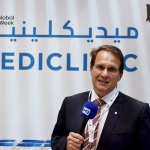Dr. Yousef, a Canadian and American board-certified dermatologist with an MBA and advanced medical dermatology fellowship, specializes in complex medical dermatology. His practice focuses on challenging conditions such as autoimmune blistering disorders, skin cancer, skin inflammation, psoriasis, and atopic dermatitis that require systemic treatment.
During the conference, Dr. Yousef delivered a talk on skin lymphoma, emphasizing its increasing prevalence in populations with skin of color, where hyperpigmentation can sometimes mask its appearance. He highlighted the importance of distinguishing it from other skin problems and tailoring treatment to the patient’s specific situation. Dr. Yousef advised that persistent skin rashes (lasting several months), especially in sun-protected areas like the armpits or buttocks, that don’t respond to usual moisturizers, warrant immediate dermatological consultation.
This marked Dr. Yousef’s first time participating in the AIDA conference, which he found to be “very interesting” with “good scientific value” and excellent networking opportunities. He praised the event for bringing together top professionals and featuring updated topics, including recent advancements in vitiligo and alopecia areata treatments. He noted that these conditions, often overlooked in the past, are now seeing significant innovation, offering new hope for patients, particularly those with vitiligo who often face social stigma.
For the general public, Dr. Yousef offered three crucial skincare tips:
- Avoid tanning.
- Wear sunscreen regularly.
- Consult a dermatologist if you notice any changing, problematic, or bleeding spots on your skin. Crucially, he cautioned against blindly following social media advice, stating that “95% what is in the social media is a pure business and marketing,” and what works for one person may not work for another.
When asked why he chose dermatology, Dr. Yousef eloquently stated, “Skin is the window to look inside your body.” He explained that the skin provides numerous clues about a person’s overall health and lifestyle, often allowing for diagnosis with minimal invasive testing.


















